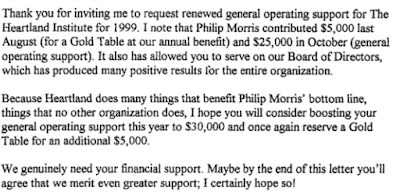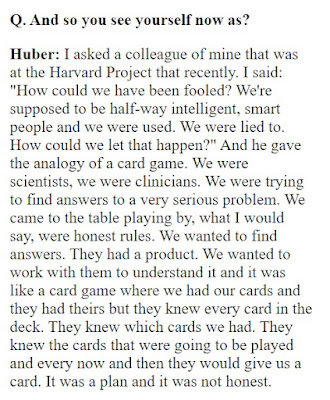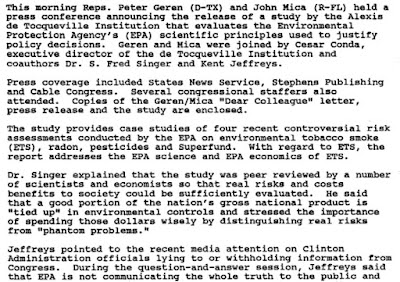Overview of previous posts here
Best known nowadays for their position on global warming, the Heartland Institute started as a think tank defending the tobacco industry. Former President Joseph L. Bast still minimizes the risks of ETS.
Heartland always had pro-tobacco viewpoints and even invited a tobacco employee (Roy E. Marden) to join its board. In 1999, Heartland president Joseph L. Bast wrote the following letter to Philip Morris:
At least 20 of the network economists are or have been involved with the Heartland Institute. and in 1999, the year Bast begged for money, 6 tobacco economists were members of the advisory board
A 1996Heartland report shows something seen in all libertarian think tanks: an attack on a whole bunch of "environmental sciences". It is very unlikely the think tankers actually knew something about the actual state of one scientific field, let alone a whole series of scientific domains. Ideology, not science, is the source of this kind of output produced by think tanks
It's one the first examples how tobacco and global warming (and other environmental/ health sciences) are thrown under the bus in one big effort. This was part of the "APCO" plan.
Author Richard L. Stroup was a member of the economists extended network
Gary L. Huber was a researcher working on the link between tobacco and lung cancer, research sponsored by the tobacco industry. In 1980, Huber (re)discovered the relation by producing emphysema in rabbits.
In the prelude to the Tobacco Master Settlement Agreement, he became a whistleblower (in 1997) claiming to be a naïve scientist duped by a broader plan of the tobacco industry. Huber claims in the interview the industry let him though his research on lung cancer, even though they had done the same research before, and already knew the outcome was going to be smoking causes cancer.
Several sources state Huber was in tears when discovering his entire research was one big waste of time. Most sources feel sorry for the man.
The book Denial: The NFL, Concussions, and the Battle for Truth states Huber promptly lost his grants from the tobacco industry after publishing his results, the industry making clear they weren't too pleased with his work. Huber subsequently moved from Harvard to the University of Kentucky and continued doing research, strangely enough again funded by the tobacco industry. But something had changed: in Kentucky Huber would become accused of manipulating scientific results, sexual harassment and general incompetence. Within a year, he got fired
All this doesn't really explain how Gary L. Huber, then working in Texas, ended up in the 1996 Heartland Earth Day '96 document, writing "In this case, the EPA's risk assessment is built on the manipulation of data, ignores crucial chemical analysis and key epidemiological data, and violates time-honored statistical principles."
I'm not sure what to think about all this, and the supposed knife the industry put in his back







